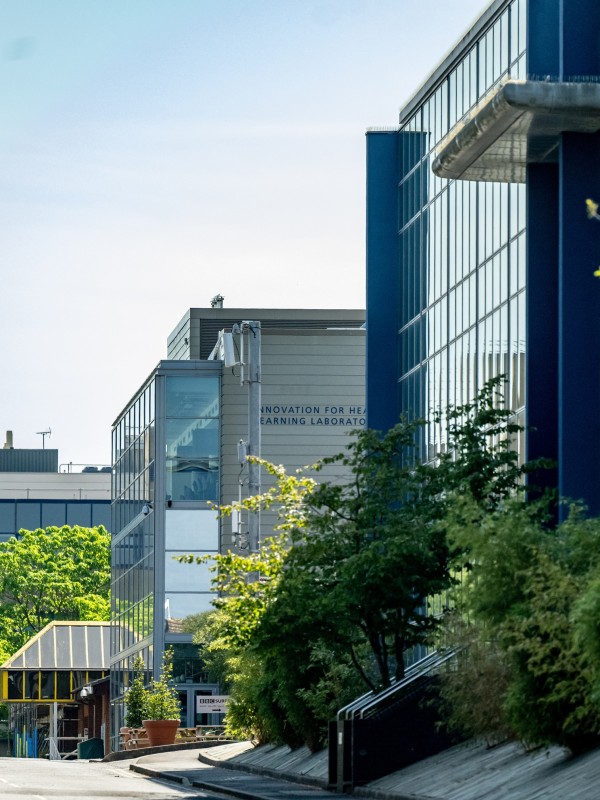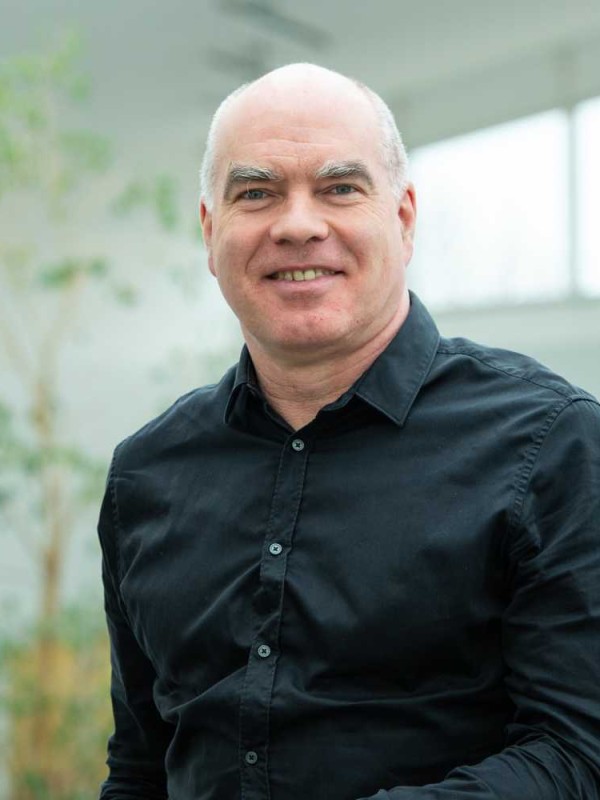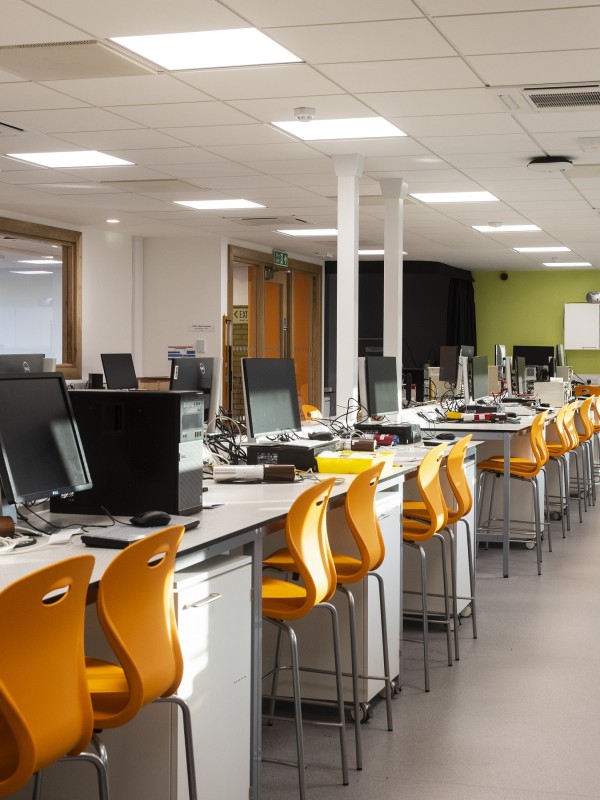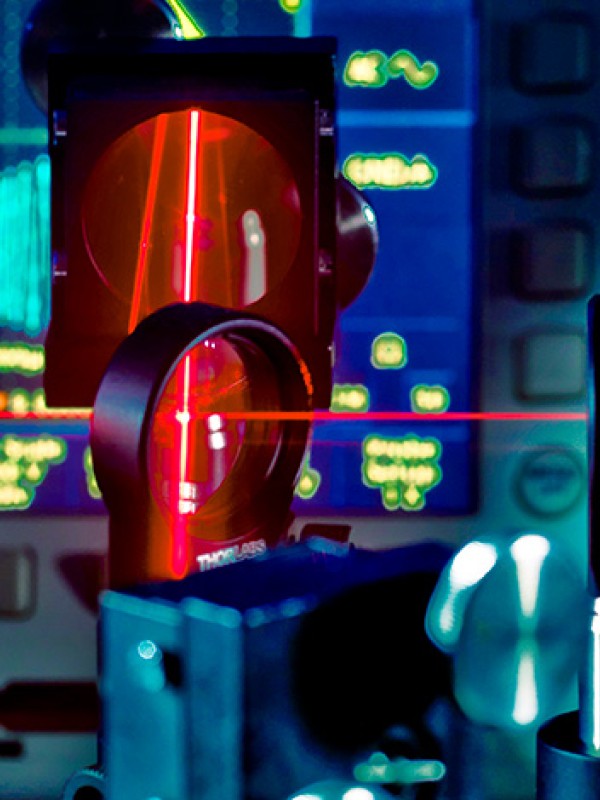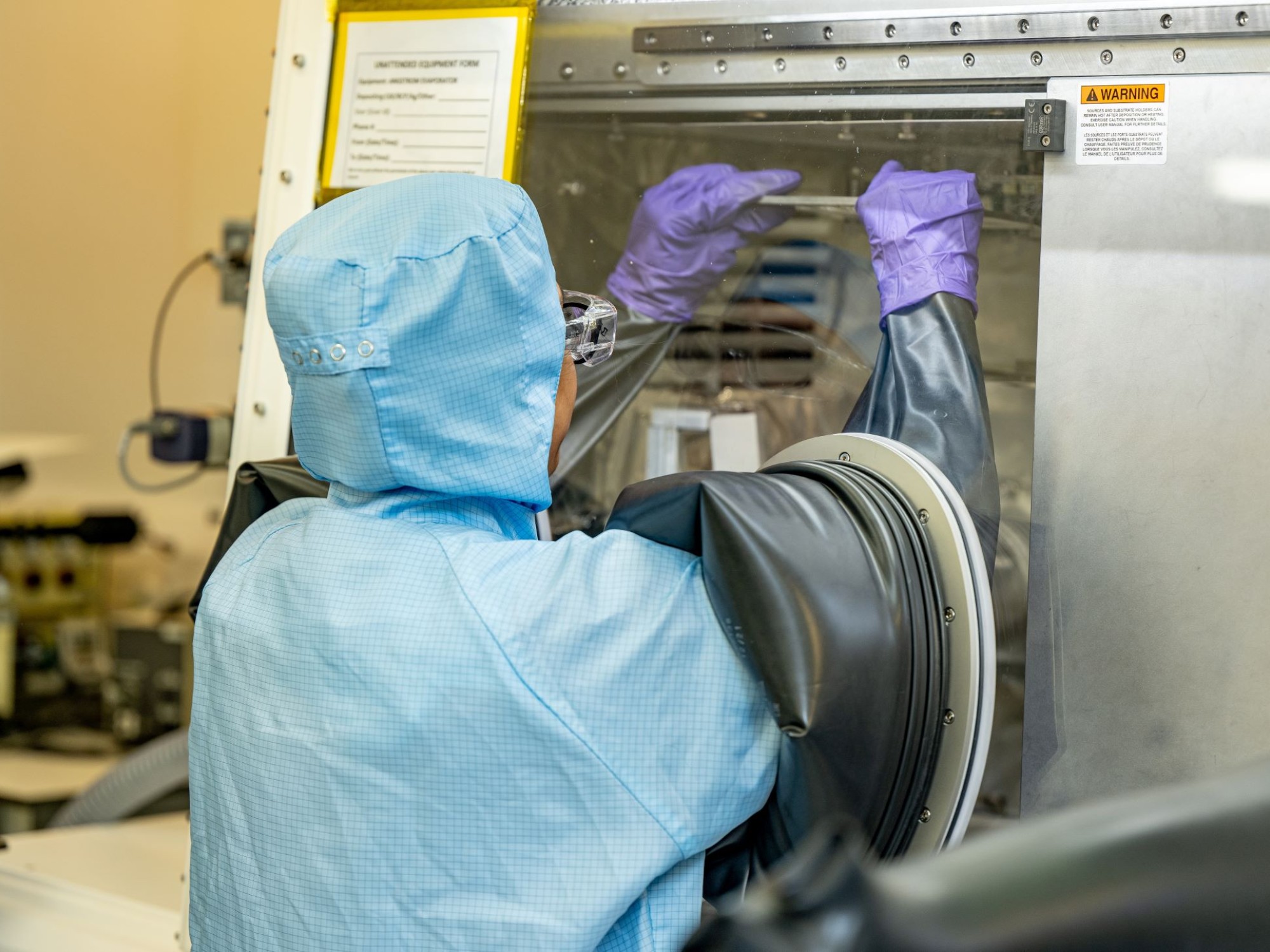
- Nuclear Science and Radiation Protection
MSc — 2026 entry Nuclear Science and Radiation Protection
How can atomic nuclei provide us with energy, help us monitor the environment, benefit medicine and more? Our Nuclear Science and Radiation Protection MSc course offers an in-depth understanding of nuclear science and radiation protection. Its significant emphasis on practical applications allows students to connect theoretical concepts with real-world industry scenarios.
3,474+ people have created a bespoke digital prospectus
Why choose
this course?
Our innovative MSc in Nuclear Science and Radiation Protection is taught by a combination of inspired nuclear physics academics from Surrey’s School of Mathematics and Physics and expert industry professionals from the UK’s nuclear industries.
Our academics are part of the following groups, which house the largest academic nuclear physics research hub in the UK:
- Experimental Nuclear Physics Group
- Radiation and Medical Physics Group
- Theoretical Nuclear Physics Group.
There are generous external funding opportunities available for students on this course. This includes the IAEA Marie Sklodowska-Curie Fellowship Programme, which aims to help increase the number of women in the nuclear field, and the Bursary Scheme offered by The Nuclear Industry Benevolent Fund.
EDI status
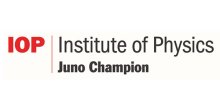
What you will study
Drawing upon our thorough expertise and excellent research, this course will give you deep knowledge of nuclear science and radiation protection. Its substantial practical element enables students to relate taught material to industry-relevant applications.
Formal lectures are complemented with work in our specialist radiation laboratories, which were recently refurbished and enlarged at a cost of £2.7 million. In these facilities, you'll work with a wide range of radioactive sources and radiation detectors.
There’s also an extended project in the spring and an 11-week MSc dissertation project in the summer.
Research-led teaching
In addition to the formal lectures for taught modules, our course provides a wide range of experimental hands-on training. This includes eight weeks of practical radiation physics laboratory classes in the specialist radiation laboratories within the University’s School of Mathematics and Physics.
As well as the laboratory training, you’ll carry out a research group project during the spring semester as a precursor to the 11-week research dissertation project, which makes up the final part of your MSc. There are many opportunities for the summer dissertation project to be taken in an external industrial environment.
Equality and diversity
We’re committed to fostering the next generation of physicists in an environment that is diverse and inclusive, ensuring equal opportunities for all, independent of race, age, gender, sexual orientation, disability or other protected characteristics.
We’re a member of the Institute of Physics’ equality and diversity initiative, Project Juno, which rewards physics departments for promoting gender equality in physics. We are proud to have been awarded Juno Champion status.
We also have an active Equality, Diversity and Inclusion (ED&I) group within the School of Mathematics and Physics, which aims to grow the diversity of our student body and ensure a welcoming environment for everyone.
Teaching Assistant Scheme
Every year, our Teaching Assistant Scheme enables students on our Physics MSc programmes to earn while they study, providing teaching support to undergraduate students. Teaching assistants are involved in a range of duties, including laboratory supervision, in-class tutorial support and support with computing classes.
Our Nuclear Science and Radiation Protection MSc consists of eight taught modules and a summer dissertation. Full-time students complete four modules per semester, while part-time students typically complete two modules per semester.
Dissertation topics are normally allocated towards the end of the spring semester. Dissertation project work will be carried out during the summer period. Part-time students will work on their dissertation in the summer of their second year.
The structure of our programmes follows clear educational aims that are tailored to each programme. These are all outlined in the programme specifications which include further details such as the learning outcomes:
Modules
Modules listed are indicative, reflecting the information available at the time of publication. Modules are subject to teaching availability, student demand and/or class size caps.
The University operates a credit framework for all taught programmes based on a 15-credit tariff, meaning all modules are comprised of multiples of 15 credits.
Course options
Year 1
Semester 1
Compulsory
The module will provide students with practical skills and background knowledge needed to work in a radiation laboratory. Laboratory sessions are designed to provide the student with practical experience in handling radioactive substances, detectors and instrumentation.
View full module detailsThis course starts with an overview of human biology, followed by a discussion of the nature of the interaction of ionising and non-ionising radiation with biological systems. The course emphasises the effects at the cellular level and the impact that this has on the individual and across the population. The behaviour and effects of ingested and inhaled radionuclides are also covered.
View full module detailsThis module presents an introduction to key topics in radiation physics, the interactions of radiation with matter, and the principles of radiation measurement and dosimetry. The module also covers introductory material describing the function and operation of radiation detectors.
View full module detailsThe module provides a graduate level introduction to Atomic and Nuclear Physics. It is aimed at both students with a first degree in Physics (as a review) and also as key, underpinning material for graduates with non-physics first degrees (e.g. Engineering, Chemistry, Mathematics etc,) to provide a foundation in quantum mechanics and atomic and nuclear structure.
View full module detailsSemester 2
Compulsory
All students aiming for the MSc degree qualification undertake an MSc dissertation project. Students choose a project either from a list of proposed topics within the University, or in some cases arrangement is made for the project to be undertaken in industrial, research or hospital-based environment. The majority of part-time students arrange to undertake the project in their place of work. Students are assigned a supervisor relating to the project chosen. Students undertaking their project outside of the University are assigned both an internal and an external supervisor. The work is assessed as follows: Project write-up A write up of no more than 40 pages in total, including title page, brief abstract, text, diagrams and references must be submitted. Supervisors will give guidance on the layout of the project and the first draft of material where appropriate. When referencing in your written work, you should use the Harvard referencing system unless otherwise directed by the Module Co-ordinator. Further information relating to referencing in your work, can be found on the University Library website at http://www.surrey.ac.uk/library/subject/bibref/
View full module detailsThis module aims to provide an advanced level understanding of explosive nuclear astrophysics and the physics of stars. In particular, the course will provide an analytical underpinning of resonant reaction rates, together with the experimental techniques involved in their determination, as well as a theoretical treatment of nuclear reactions and celestial objects.
View full module detailsThe course provides an introduction to nuclear energy generation and applications of nuclear science. Nuclear reactors, their physics and operation are described. Nuclear reactor safety case work is also discussed. Future potential energy generation mechanisms such including nuclear fusion will be discussed. The module will also present a range of applications of radioactivity measurement including aspects of Environmental Science and Medical Diagnogstics and treatment therapy. The module will include some aspects of calculus and first order differential equations.
View full module detailsThe module is aimed at giving students an understanding of the use of computers in the broader context of medical physics and radiation protection. This will range from the use of Monte Carlo modelling using TOPAS for dosimetry and experimental design, to the use of Python to code simple problems related to image processing and data science. In addition, they will learn the importance of data security and data governance with specific application to a clinical context.
View full module detailsThe module provides a Level 6 (final year) introduction to the sources of radioactive materials, how they are produced and their accurate measurement. This module will also give detailed information on the sources and uses of radioactive materials for environmental, medical and industrial medical applications. The is aimed at both students studying at Level 6 or 7 in Physical Science (Physics, Chemistry etc,.) or related Engineering (e.g. Chemical or Environmental Engineering) subject. It will also serve as key, underpinning material for graduates with non-physics first degrees (e.g. Engineering, Chemistry, Mathematics etc,) to provide a foundation in the measurement and characterization of radioactive sources.
View full module detailsYear 1
Semester 1
Compulsory
The module will provide students with practical skills and background knowledge needed to work in a radiation laboratory. Laboratory sessions are designed to provide the student with practical experience in handling radioactive substances, detectors and instrumentation.
View full module detailsThis module presents an introduction to key topics in radiation physics, the interactions of radiation with matter, and the principles of radiation measurement and dosimetry. The module also covers introductory material describing the function and operation of radiation detectors.
View full module detailsThe module provides a graduate level introduction to Atomic and Nuclear Physics. It is aimed at both students with a first degree in Physics (as a review) and also as key, underpinning material for graduates with non-physics first degrees (e.g. Engineering, Chemistry, Mathematics etc,) to provide a foundation in quantum mechanics and atomic and nuclear structure.
View full module detailsSemester 2
Compulsory
This module aims to provide an advanced level understanding of explosive nuclear astrophysics and the physics of stars. In particular, the course will provide an analytical underpinning of resonant reaction rates, together with the experimental techniques involved in their determination, as well as a theoretical treatment of nuclear reactions and celestial objects.
View full module detailsThe course provides an introduction to nuclear energy generation and applications of nuclear science. Nuclear reactors, their physics and operation are described. Nuclear reactor safety case work is also discussed. Future potential energy generation mechanisms such including nuclear fusion will be discussed. The module will also present a range of applications of radioactivity measurement including aspects of Environmental Science and Medical Diagnogstics and treatment therapy. The module will include some aspects of calculus and first order differential equations.
View full module detailsThe module is aimed at giving students an understanding of the use of computers in the broader context of medical physics and radiation protection. This will range from the use of Monte Carlo modelling using TOPAS for dosimetry and experimental design, to the use of Python to code simple problems related to image processing and data science. In addition, they will learn the importance of data security and data governance with specific application to a clinical context.
View full module detailsThe module provides a Level 6 (final year) introduction to the sources of radioactive materials, how they are produced and their accurate measurement. This module will also give detailed information on the sources and uses of radioactive materials for environmental, medical and industrial medical applications. The is aimed at both students studying at Level 6 or 7 in Physical Science (Physics, Chemistry etc,.) or related Engineering (e.g. Chemical or Environmental Engineering) subject. It will also serve as key, underpinning material for graduates with non-physics first degrees (e.g. Engineering, Chemistry, Mathematics etc,) to provide a foundation in the measurement and characterization of radioactive sources.
View full module detailsYear 2
Semester 1
Compulsory
The module will provide students with practical skills and background knowledge needed to work in a radiation laboratory. Laboratory sessions are designed to provide the student with practical experience in handling radioactive substances, detectors and instrumentation.
View full module detailsThis course starts with an overview of human biology, followed by a discussion of the nature of the interaction of ionising and non-ionising radiation with biological systems. The course emphasises the effects at the cellular level and the impact that this has on the individual and across the population. The behaviour and effects of ingested and inhaled radionuclides are also covered.
View full module detailsSemester 2
Compulsory
All students aiming for the MSc degree qualification undertake an MSc dissertation project. Students choose a project either from a list of proposed topics within the University, or in some cases arrangement is made for the project to be undertaken in industrial, research or hospital-based environment. The majority of part-time students arrange to undertake the project in their place of work. Students are assigned a supervisor relating to the project chosen. Students undertaking their project outside of the University are assigned both an internal and an external supervisor. The work is assessed as follows: Project write-up A write up of no more than 40 pages in total, including title page, brief abstract, text, diagrams and references must be submitted. Supervisors will give guidance on the layout of the project and the first draft of material where appropriate. When referencing in your written work, you should use the Harvard referencing system unless otherwise directed by the Module Co-ordinator. Further information relating to referencing in your work, can be found on the University Library website at http://www.surrey.ac.uk/library/subject/bibref/
View full module detailsThis module aims to provide an advanced level understanding of explosive nuclear astrophysics and the physics of stars. In particular, the course will provide an analytical underpinning of resonant reaction rates, together with the experimental techniques involved in their determination, as well as a theoretical treatment of nuclear reactions and celestial objects.
View full module detailsThe course provides an introduction to nuclear energy generation and applications of nuclear science. Nuclear reactors, their physics and operation are described. Nuclear reactor safety case work is also discussed. Future potential energy generation mechanisms such including nuclear fusion will be discussed. The module will also present a range of applications of radioactivity measurement including aspects of Environmental Science and Medical Diagnogstics and treatment therapy. The module will include some aspects of calculus and first order differential equations.
View full module detailsGeneral course information
Contact hours
Contact hours can vary across our modules. Full details of the contact hours for each module are available from the University of Surrey's module catalogue. See the modules section for more information.
Timetable
New students will receive their personalised timetable during Welcome Week. In later semesters, at least one week before the start of the semester.
Scheduled teaching can take place on any day of the week (Monday – Friday), with part-time classes normally scheduled for one or two days. Wednesday afternoons tend to be for sports and cultural activities.
View our code of practice for the scheduling of teaching and assessment (PDF) for more information.
Location
This course is based at Stag Hill campus. Stag Hill is the University's main campus and where the majority of our courses are taught.
We offer careers information, advice and guidance to all students whilst studying with us, which is extended to our alumni for three years after leaving the University.
As a graduate of this course, you’ll have job opportunities in the nuclear industry, which is a growing and international sector.
Former students have secured roles at UK and overseas nuclear regulatory agencies, in the nuclear industry and at the National Physical Laboratory, among others. This MSc can also lead to further study, such as completing a PhD.

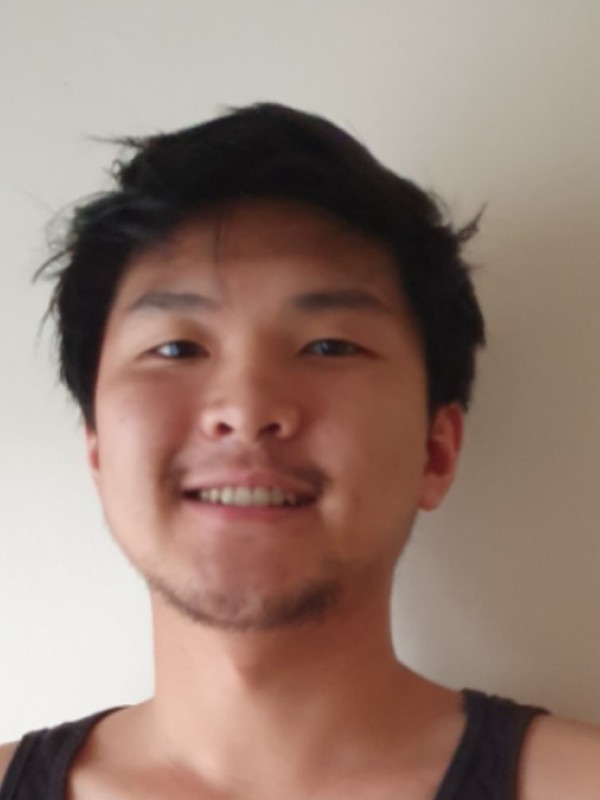
Iain Lee
Student - Nuclear Science and Applications MSc
"The tutors are always happy to help if you have questions via email or after class, while students are encouraged to innovate and be creative during assessments and conduct research themselves under guidance."
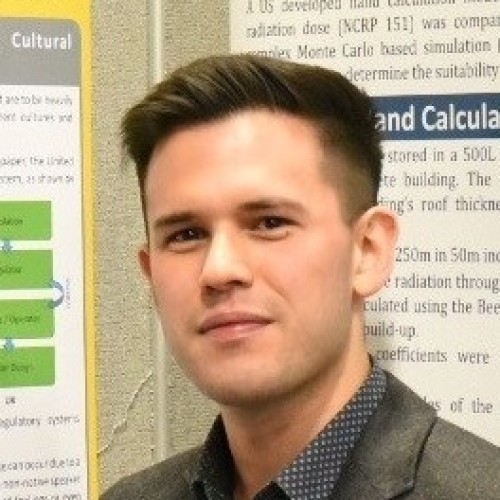
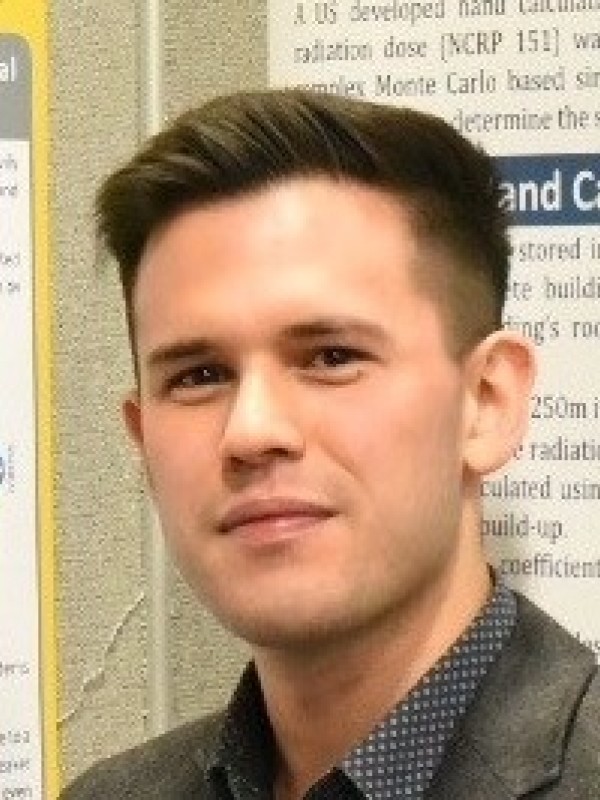
Peter Bryant
Graduate - Radiation and Environmental Protection MSc
"The course really helped prepare me for my future career – I apply almost every element of my MSc on a daily basis – and allowed me to make a wealth of useful contacts."
UK qualifications
A minimum of a 2:2 UK honours degree in chemistry, engineering, environmental sciences, nuclear science, physics, radiography or radiological science, or a recognised equivalent international qualification.
We'll also consider relevant work experience if you don't meet these requirements.
English language requirements
IELTS Academic: 6.5 overall with 6.0 in writing and 5.5 in each other element.
These are the English language qualifications and levels that we can accept.
If you do not currently meet the level required for your programme, we offer intensive pre-sessional English language courses, designed to take you to the level of English ability and skill required for your studies here.
Recognition of prior learning
We recognise that many students enter their course with valuable knowledge and skills developed through a range of ways.
If this applies to you, the recognition of prior learning process may mean you can join a course without the formal entry requirements, or at a point appropriate to your previous learning and experience.
There are restrictions for some courses and fees may be payable for certain claims. Please contact the Admissions team with any queries.
Fees per year
Explore UKCISA’s website for more information if you are unsure whether you are a UK or overseas student. View the list of fees for all postgraduate courses.
September 2026 - Full-time - 1 year
- UK
- £11,900
- Overseas
- £25,900
September 2026 - Part-time - 2 years
- UK
- £6,000
- Overseas
- £13,000
- These fees apply to students commencing study in the academic year 2026-27 only. Fees for new starters are reviewed annually.
Payment schedule
- Students with Tuition Fee Loan: the Student Loans Company pay fees in line with their schedule (students on an unstructured self-paced part-time course are not eligible for a Tuition Fee Loan).
- Students without a Tuition Fee Loan: pay their fees either in full at the beginning of the programme or in two instalments as follows:
- 50% payable 10 days after the invoice date (expected to be October/November of each academic year)
- 50% in January of the same academic year.
- Students on part-time programmes where fees are paid on a modular basis: cannot pay fees by instalment.
- Sponsored students: must provide us with valid sponsorship information that covers the period of study.
The exact date(s) will be on invoices.
Additional costs
There could be potential travel costs (which may be reimbursable) for the dissertation if the topic requires travel to case study sites.
Funding
You may be able to borrow money to help pay your tuition fees and support you with your living costs. Find out more about postgraduate student finance.
External funding opportunities are available for MSc students on this course through:
- The Bursary Scheme offered by The Nuclear Industry Benevolent Fund (TNIBF)
- The IAEA Marie Sklodowska-Curie Fellowship Programme (MSCFP), which provides funding for female students for tuition and living costs.
Physics MSc students also have the opportunity to earn while they study through the MSc Teaching Assistant Scheme.
You may be able to borrow money to help pay your tuition fees and support you with your living costs. Find out more about postgraduate student finance.
Apply online
To apply online first select the course you'd like to apply for then log in.
Select your course
Choose the course option you wish to apply for.
Sign in
Create an account and sign into our application portal.
Applications are not yet open. If you would like us to email you when they open, then please register your interest.
Register your interestApplications are not yet open. If you would like us to email you when they open, then please register your interest.
Register your interestAdmissions information
Once you apply, you can expect to hear back from us within 14 days. This might be with a decision on your application or with a request for further information.
Our code of practice for postgraduate taught admissions explains how the Admissions team considers applications and admits students. Read our postgraduate applicant guidance for more information on applying.
About the University of Surrey
Need more information?
Contact our Admissions team or talk to a current University of Surrey student online.
Terms and conditions
When you accept an offer to study at the University of Surrey, you are agreeing to follow our policies and procedures, student regulations, and terms and conditions.
We provide these terms and conditions at offer stage and are shown again at registration. You will be asked to accept these terms and conditions when you accept the offer made to you.
View our generic registration terms and conditions (PDF) for the 2025/26 academic year, as a guide on what to expect.
Disclaimer
This online prospectus has been published in advance of the academic year to which it applies.
Whilst we have done everything possible to ensure this information is accurate, some changes may happen between publishing and the start of the course.
It is important to check this website for any updates before you apply for a course with us. Read our full disclaimer.
